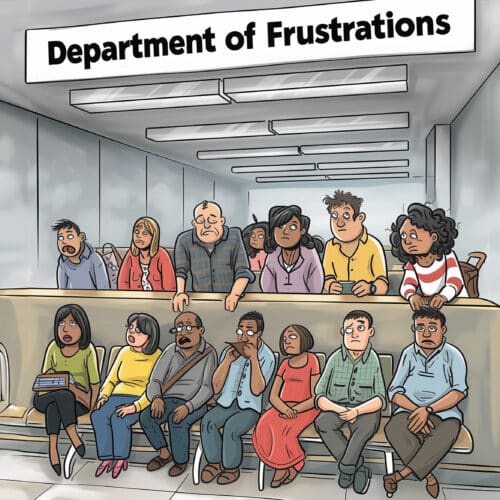“Meetings are indispensable when you don’t want to do anything.”
– John Kenneth Galbraith
Imagine you’re trapped in a room; the only escape is through a door marked “Effective Use of Time”. You look around; there are too many people, too much noise, and not enough air. That’s what it feels like to be in a meeting that should’ve been an email.
Does your calendar look like a rainbow explosion of Legos? It’s a red flag when your boss’s calendar resembles a Tetris game on hard mode. Sure, being busy feels good, but only when it’s productive.
 Here’s the thing about meetings: they’re expensive and time-consuming, and often, a handful of people actually move the needle while others are just spectators. It’s like inviting the whole neighborhood to your dinner party; it’s chaotic, and the food runs out before everyone gets a taste…
Here’s the thing about meetings: they’re expensive and time-consuming, and often, a handful of people actually move the needle while others are just spectators. It’s like inviting the whole neighborhood to your dinner party; it’s chaotic, and the food runs out before everyone gets a taste…
When there are too many people in a meeting it reduces the productivity of the key members that need to be involved, wastes time for coworkers who could simply read the meeting minutes, and increases the overall cost of the meeting.
To fix this, you can start by building an understanding of:
- Why you are inviting someone to a meeting
- Why you are attending a meeting
Figuring out these insights will help you determine exactly who should be involved in a meeting and who has nothing to contribute. That doesn’t mean they aren’t contributors or that they’re not valuable and beloved humans.
Why on earth do we treat meetings like they’re parties that everyone wants to be invited to? In today’s world, leaving someone off of your invite list should be a cause for celebration! Next time you decide not to invite someone on your team to a meeting because they just aren’t necessary and won’t be able to add anything at this juncture, send them a note: “I thought you’d want to know that I almost invited you to this meeting. And then I didn’t! You’re welcome. Use the time wisely!” See if they don’t thank you profusely and start doing the same.
Transform your leadership & master the art of meeting management.
Learn more about PointerWise’s highly effective Executive Coaching.
5 Reasons to Invite Someone to Your Meeting
1) They are a decision maker. You’re waiting on a big decision and need approval from the big guns. There’s no point in meeting if this person can’t make it. Decision-makers are inherently invited to more meetings simply because they must approve or deny decisions for the next step to begin. Be mindful of their time and let them know they’re free to leave once their part is done. There’s no reason to have someone sit in an hour-long meeting if only 5 minutes applies to them. And, if the purpose of the meeting is to formulate the ask of the decision-maker, don’t invite them and ask them after. Do they need to hear how you came up with the ask? Do they need to put their 5 cents in on the ask? If so, they should be there, but otherwise, they will do better things with their time – like make more decisions!
 2) They have vital expertise to contribute. Does the sales manager need to be involved in a discussion on the best way to respond to a support case? Probably not. Does the COO need to sit in a brainstorming session about your latest marketing campaign slogan? Probably not. However, having the SEO expert in a meeting on driving web traffic may make a lot more sense. Steve Jobs was famous for kicking people out of meetings who didn’t need to be there, defined as “Everyone in the room should be there for a reason. There’s no such thing as a compassionate invitation. Either you’re critical to the meeting, or you’re not.”
2) They have vital expertise to contribute. Does the sales manager need to be involved in a discussion on the best way to respond to a support case? Probably not. Does the COO need to sit in a brainstorming session about your latest marketing campaign slogan? Probably not. However, having the SEO expert in a meeting on driving web traffic may make a lot more sense. Steve Jobs was famous for kicking people out of meetings who didn’t need to be there, defined as “Everyone in the room should be there for a reason. There’s no such thing as a compassionate invitation. Either you’re critical to the meeting, or you’re not.”
3) The conversation is bigger than a quick email or IM. Make sure the objective actually requires a meeting. Sometimes, a quick update can be done via email or a short IM conversation. Do you find yourself scheduling meetings and then realizing 2 short conversations could have done the same job? If you’re engaged in an email string that goes on for even half a day, a quick call might be better. But don’t go with the duality mindset that you have only two choices – written conversation or meeting. Telephones are still a thing, and before videoconferencing became the norm, we got along just fine without seeing people’s faces constantly. Save the face time (whether virtual or for real) for when you really need a meeting, and you’ll save time, energy, and your sanity.
 4) The outcome impacts them. If the person has a stake in the decision or direction, they may need to be there to contribute. That means you may need to hear from them directly on how the decision will impact them and what you may wish to consider before reaching a conclusion. However, here’s an opportunity to allow that person to attend and leave in short order or to meet with them separately before the big decision-making meeting.
4) The outcome impacts them. If the person has a stake in the decision or direction, they may need to be there to contribute. That means you may need to hear from them directly on how the decision will impact them and what you may wish to consider before reaching a conclusion. However, here’s an opportunity to allow that person to attend and leave in short order or to meet with them separately before the big decision-making meeting.
5) There’s a conflict that needs to be debated. If the decision at hand is blocked or complicated by conflict, it’s time to have a meeting face to face or ear to ear. Human connection is important in handling conflict productively. It takes practice. Emails and IMs tend to make us bolder about our opinions and less open to listening. They are stripped of the facial expressions and body language that help us stay calm during ideological debates, which makes us more likely to engage in unhealthy conflict due to misinterpretations.
Effective meetings start with you.
Learn how our Executive Coaching can refine your meeting strategy.
5 Ways to Decline a Meeting Invite
1) Ask for data via email, IM channel, or shared digital folder instead. We’ve all been asked to attend long meetings simply to review a short weekly report. Unless it requires a detailed explanation…or you expect questions/discussions/conflict, send out the data in an Excel or Google doc that allows people to read it on their own time, and ask the organizer if you still need to attend. How many meetings would this eliminate from your calendar?
2) Ask to be sent meeting minutes instead. We often get invited to meetings just to “keep you in the loop.” Instead of listening to 3-4 other people talk while you get live updates (and waste valuable time), ask to have the meeting minutes sent out at the conclusion of the meeting. Meeting minutes should outline key decisions, action items, and important notes. These should be legible, organized, and sent within an hour of the meeting to ensure the meeting is still top-of-mind. I use an AI Notetaker for videoconference meetings, and it does a great job of summarizing and outlining action items. It’s ready to send right after each meeting closes, along with a transcript, summary bullets, and links to the recorded video.

3) Your boss invited you to a meeting but didn’t give you any details. Sometimes, you will get invites from your boss or a person in a position of power tagging you on a mass meeting invite. You know you don’t necessarily have anything to contribute, but you don’t want to disappoint your boss. While you should be happy they don’t want you to feel left out, try explaining: “Charlie, I’m pretty busy focusing on project ____ that is due in two weeks. Can you provide some context to help me understand if my attendance is critical in this meeting? Also, can you ask the organizer if they can pass along the meeting agenda to me? Thanks…”
4) You’re double-booked and someone may feel dissed by your opting out. When you are double-booked and concerned about the reaction of the person leading the lower priority meeting, a polite and thoughtful decline is in order. Be honest and stress the urgency of the other meeting with a small explanation that shows respect. For example: “Hi ____, I’d love to attend your meeting on _____, but I need to attend the meeting on _________ because we are making a decision about ________ and our deadline is _________. Please let me know if I can send over anything in advance to help out, and I’d love to be still included in the meeting minutes.”
5) There is no clear agenda or objective. Sometimes, people just like to socialize or talk in an echo chamber. Or they don’t know how to run a meeting, and you’ve become accustomed to dreading your attendance because nothing ever really gets done. Ask to be sent an agenda to make sure it is something you can help contribute to. Maybe going to that meeting won’t look quite as important anymore…
So, next time you’re about to hit “Send” on that invite, pause. Think of that room and the door marked “Effective Use of Time”. Make sure everyone in your meeting has a key to that door, and you’re not just filling seats.
“If you had to identify, in one word, the reason why the human race has not achieved, and never will achieve, its full potential, that word would be ‘meetings.'” — Dave Barry
Take the first step towards more productive and meaningful meetings.
Contact us today for customized solutions that drive efficiency and decision-making.
Your leadership journey begins here!






